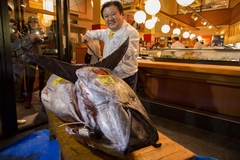
The fresh whole tuna weighed 222 kilograms (489 pounds) at the market’s first auction of 2013 yesterday. The price compares with the 56 million yen Kiyomura paid last year to take an auction Itamae Sushi Japan K.K., an affiliate of the Hong Kong- based Taste of Japan Group, won the previous year.
Kiyomura could lose as much as 154 million yen on the purchase, based on the estimated 15,540 yen it paid for each piece of sushi and the minimum 128 yen it charges per serving. The chain’s president said last year it made the record bid to ensure the fish was won by a Japanese following the March 11, 2011, earthquake. This year, amid heightened geopolitical tension with China, President Kiyoshi Kimura said he expected people from both countries to partake.
“There are some political difficulties, but Japanese customers and Chinese customers come to our restaurant, and what we want is for everyone to enjoy our sushi,” Kimura said in an interview at his Tsukiji restaurant after the 5:30 a.m. auction. He said that while his bid was “expensive,” the company would serve the auspicious fish at regular prices.
By 3:30 a.m., bidders had begun arriving at the warehouse- like tuna auction building to inspect the fish. Two hours later, at the ring of a hand-bell, traders started thrusting arms up, hands signaling the amounts of their bids. Seconds later, the deal was done for the year’s first tuna.
Global Pace
Auctions at Tsukiji, the world’s largest fish market that stretches over an area the size of 43 football fields, influence prices all over the world, according to Sasha Issenberg, author of “The Sushi Economy.”
“It’s like a combination of Wall Street and Sotheby’s in the art market and a commodities trading floor,” he said.
Itamae had bid as much as 151 million yen for the fish, Makoto Kondo, a spokesman for the Hong Kong-based sushi chain, said by phone yesterday. He also said the company’s intention was to share the fish with Japanese customers.
“Until last year, we took the tuna to our customers overseas, but we really wanted to deliver it to the Japanese people, so the fact that we lost is very unfortunate,” Kondo said.
The bluefin, caught off the coast of Japan’s northeastern Aomori prefecture, will be carved into about 10,000 pieces of sushi, Kimura of Kiyomura said.
Fish Country
Japanese eat more fish per capita than any other developed country, consuming about 56.7 kilograms (128 pounds) annually, compared with a global average of 17.1 kilograms, according to the United Nations Food and Agriculture Organization.
The winning bid for tuna at the first auction of the year at Tsukiji averaged about 14.5 million yen over the past 10 years, according to the Tokyo Metropolitan Central Wholesale Market website. Daily trading volume at Tsukiji averaged about 1.55 billion yen in 2011, according to Hiroshi Mochizuki, a spokesman for the market.
Tsukiji, where visitors gather as early as 4 a.m. Tokyo time to observe competing buyers using hand signals to bid at tuna auctions, is listed among Japan’s most popular attractions by the Japan National Tourism Organization.
The Tokyo Metropolitan Government has delayed plans to relocate fish market to neighboring Koto Ward by a year as soil decontamination at the new site is taking longer than expected, the Nikkei newspaper reported Dec. 31, 2012.
Tensions between Japan and China escalated last year after Japan nationalized a set of South China Sea islands claimed by both countries.





